40+ Rhetorical Question Examples
A rhetorical question is a powerful tool in English that engages the audience by asking a question where the answer is implied rather than directly stated. This technique, often used in speeches and writing, helps emphasize a point, provoke thought, or persuade the audience without expecting a response. By incorporating rhetorical questions, writers and speakers can make their message more compelling and memorable, effectively utilizing one of the key rhetorical devices in the English language.
What Is a Rhetorical Question?
Types of Rhetorical Question
- Hypophora
A hypophora occurs when the speaker asks a question and immediately answers it. This technique helps guide the audience to the speaker’s conclusion. For example, “What makes a great leader? A great leader inspires and motivates their team.” - Erotesis
An erotesis is a strong, emphatic question asked to assert or deny something. The speaker does not expect an answer because the question itself implies it. For instance, “How could I be so careless?” suggests the speaker acknowledges their mistake. - Epiplexis
Epiplexis involves asking a question to criticize or reproach rather than to elicit an answer. This type often conveys frustration or disapproval. For example, “Why do you never listen?” expresses the speaker’s dissatisfaction with the listener’s behavior. - Ratiocinatio
Ratiocinatio uses a question to anticipate and refute possible objections. The speaker asks a question that the audience might have, then provides the answer to counter the objection. For instance, “You might wonder if this plan is too ambitious. However, we have the resources and dedication to succeed.” - Antipophora
Antipophora is similar to hypophora but focuses on asking and answering the audience’s likely questions or concerns. The speaker addresses potential doubts directly. For example, “What if this strategy fails? We have a backup plan to ensure we stay on track.”
Examples of Rhetorical Question
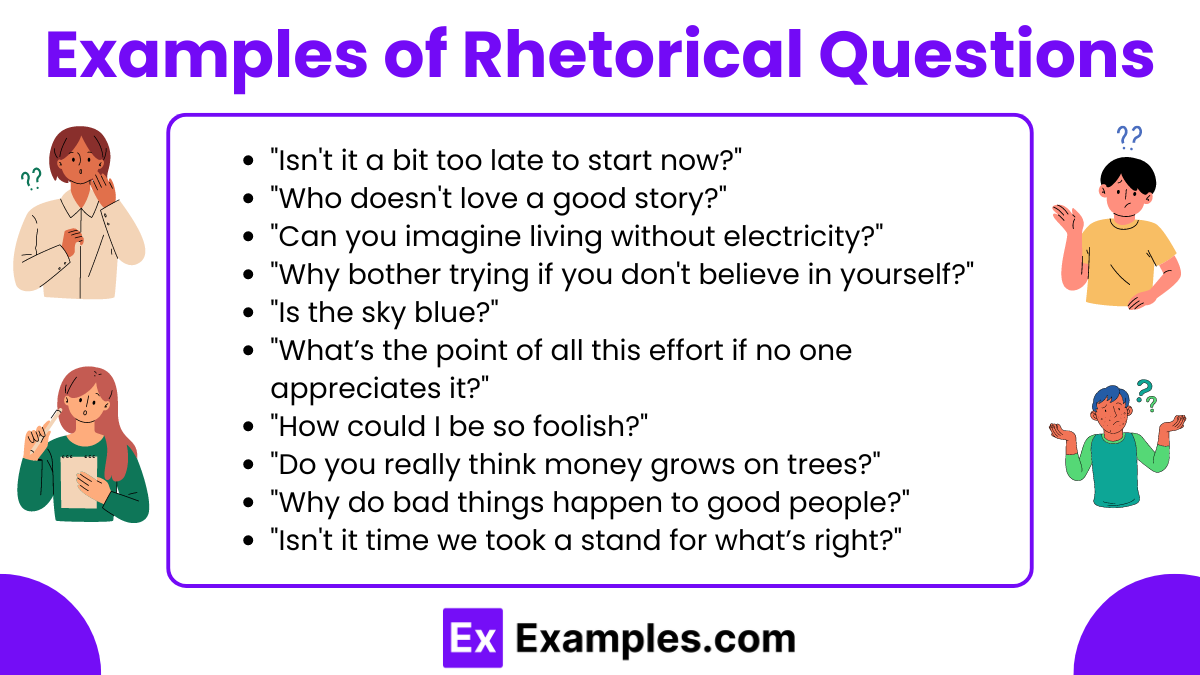
- “Isn’t it a bit too late to start now?”
- “Who doesn’t love a good story?”
- “Can you imagine living without electricity?”
- “Why bother trying if you don’t believe in yourself?”
- “Is the sky blue?”
- “What’s the point of all this effort if no one appreciates it?”
- “How could I be so foolish?”
- “Do you really think money grows on trees?”
- “Why do bad things happen to good people?”
- “Isn’t it time we took a stand for what’s right?”
Examples of Rhetorical Question in a Sentences
- “Isn’t it a beautiful day today?”
- “Why can’t we all just get along?”
- “Do you want to be a follower or a leader?”
- “Who wouldn’t want to win the lottery?”
- “Why should we accept mediocrity?”
- “Is this the best we can do?”
- “How can anyone deny climate change?”
- “Isn’t knowledge the greatest power?”
- “Why do you always leave your homework until the last minute?”
- “Can you imagine a world without art?”
Examples of Rhetorical Questions in Literature
- “What’s in a name? That which we call a rose by any other name would smell as sweet.” – William Shakespeare, Romeo and Juliet
- “If you prick us, do we not bleed? If you tickle us, do we not laugh?” – William Shakespeare, The Merchant of Venice
- “Are we not like two volumes of one book?” – Marceline Desbordes-Valmore, To Alphonse de Lamartine
- “Shall I compare thee to a summer’s day?” – William Shakespeare, Sonnet 18
- “O Wind, If Winter comes, can Spring be far behind?” – Percy Bysshe Shelley, Ode to the West Wind
- “What’s Montague? It is nor hand, nor foot, nor arm, nor face, nor any other part belonging to a man.” – William Shakespeare, Romeo and Juliet
- “How can I then return in happy plight, That am debarred the benefit of rest?” – William Shakespeare, Sonnet 28
- “When will you be wise, O wandering mind?” – Geoffrey Chaucer, The Canterbury Tales
- “Is this a dagger which I see before me, the handle toward my hand?” – William Shakespeare, Macbeth
- “Was this the face that launched a thousand ships?” – Christopher Marlowe, Doctor Faustus
Examples of Rhetorical Question for Students
- “Do you want to fail this class?”
- “Isn’t it important to study for your exams?”
- “How can you learn if you don’t ask questions?”
- “Do you think success comes without effort?”
- “Why wouldn’t you take advantage of extra credit opportunities?”
- “Isn’t participating in class discussions beneficial?”
- “Can you imagine a future without a good education?”
- “Why would you ignore the importance of homework?”
- “Do you want to be unprepared for the test?”
- “Isn’t it easier to complete your assignments on time?”
1. Rhetorical Question Template
2. Rhetorical Questions as Redundant Interrogatives
3. Rhetorical Questions Powerpoint
4. Rhetorical Question Use and Resistance to Persuasion
5. Pragmatics of Rhetorical Questions
6. Rhetorical Questions in Sunwar
7. Three Rhetorical Questions
8. Presentations Rhetorical Questions
9. Rhetorical Question Concerning Glitch
10. Rhetorical Questions in German Political Speech
11. Cognitive Pragmatic Study of Rhetorical Questions
How To Use Rhetorical Questions as a Literary Device
Well-written rhetorical questions can improve specific parts of the text by allowing the writer to emphasize certain points of their written text. There are many studies of rhetorical questions and templates you can look up on the list above.
Step 1: Outline the Whole Statement, Scene, or Text
Begin by creating an outline that will try and succinctly cover the whole text. The outline will provide the structure and direction, which will allow you to easily plot out the setup and the rhetorical question.
Step 2: Write the Set Up for the Rhetorical Question
An effective rhetorical question needs to be preceded by a set-up that creates context and provides the reader with a recent event. Write a situation or a couple of statements that will preface the rhetorical question.
Step 3: Formulate a Question that is Opposite of The Most Recent Event
The rhetorical questions should try to ask a question that is obviously opposite or a juxtaposition of the recent event or set-up you have provided. Be sure to pose the rhetorical question as question with the appropriate punctuation.
Step 4: Re-read and Edit the Whole Text
When you have finished writing the whole text, be sure to re-read the whole text and edit any issues that may pop up. You can also have an outside person read the text and provide feedback for you to work on.
Tips for Using Rhetorical Questions
- Know Your Purpose – Use rhetorical questions to emphasize a point, provoke thought, or engage the audience.
- Use Sparingly – Avoid overusing rhetorical questions to maintain their impact and effectiveness.
- Match Tone and Context – Ensure the question fits the tone of your message and the context in which you’re speaking or writing.
- Be Clear and Direct – Make sure the rhetorical question is easily understood and directly related to your main point.
- Anticipate Audience Reaction – Consider how your audience might respond mentally to the question to ensure it achieves the desired effect.
- Complement with Evidence – Follow rhetorical questions with supporting evidence or statements to strengthen your argument.
- Engage Emotionally – Use questions that resonate emotionally to create a stronger connection with your audience.
- Use in Introductions and Conclusions – Employ rhetorical questions at the beginning to hook the audience or at the end to leave a lasting impression.
- Vary Your Questions – Mix different types of rhetorical questions (e.g., hypophora, erotesis) to keep your audience engaged.
- Practice Delivery – If speaking, practice your delivery to ensure the rhetorical question sounds natural and impactful.
How do you know if a question is rhetorical?
A question is rhetorical if it doesn’t seek an answer but aims to make a point, provoke thought, or emphasize an idea.
What Is the Rule of Rhetorical Question?
The rule of a rhetorical question is to ask without expecting a response, using it to highlight an argument or engage the audience.
How to Ask a Rhetorical Question?
Ask a rhetorical question by posing a thought-provoking query that emphasizes a point or leads the audience to a conclusion without needing an answer.
What Is a Question That Cannot Be Answered?
A question that cannot be answered often addresses complex, philosophical, or hypothetical scenarios, such as “What is the meaning of life?”
Why use rhetorical questions?
They engage the audience, emphasize a point, and encourage deeper thinking about a topic.
Are rhetorical questions answered?
Typically, no. They imply their own answers.
Where are rhetorical questions used?
They are commonly used in speeches, literature, and persuasive writing to engage and persuade the audience.
Can rhetorical questions be used in essays?
Yes, they can highlight important points and engage readers in essays.
Do rhetorical questions need answers?
No, rhetorical questions are meant to provoke thought or emphasize a point, not to be answered.
What is meant by a rhetoric question?
A rhetorical question is a question asked to make a point or provoke thought rather than to get an answer. It emphasizes an idea or encourages reflection.
40+ Rhetorical Question Examples
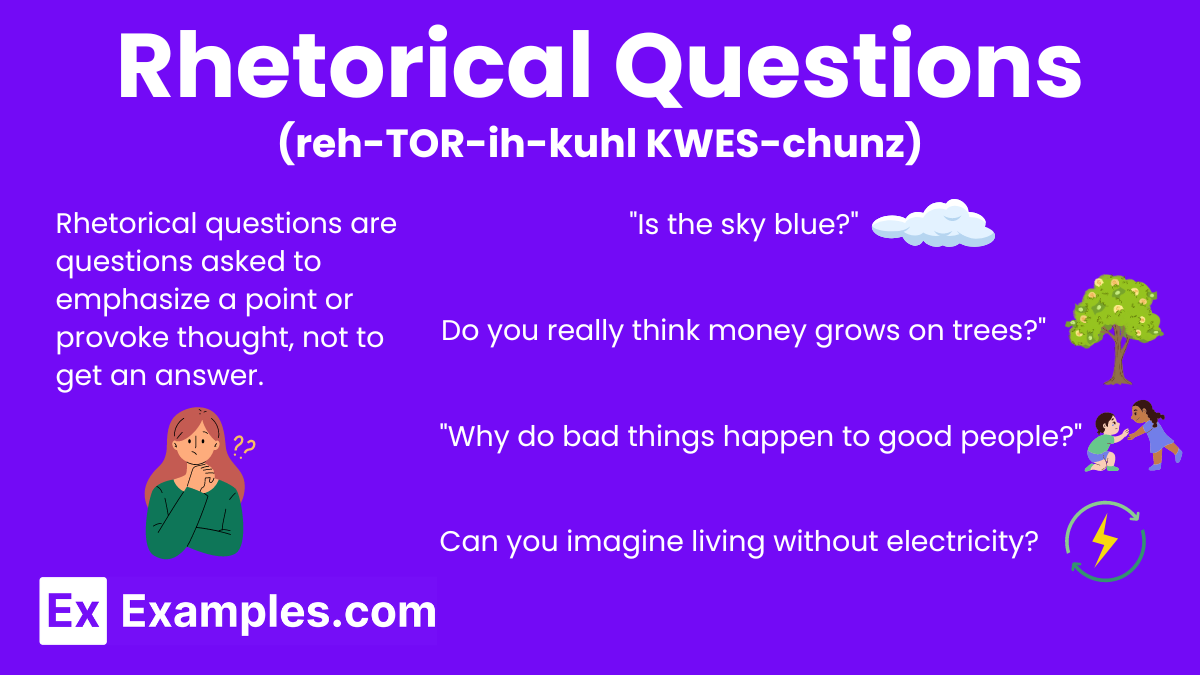
A rhetorical question is a powerful tool in English that engages the audience by asking a question where the answer is implied rather than directly stated. This technique, often used in speeches and writing, helps emphasize a point, provoke thought, or persuade the audience without expecting a response. By incorporating rhetorical questions, writers and speakers can make their message more compelling and memorable, effectively utilizing one of the key rhetorical devices in the English language.
What Is a Rhetorical Question?
A rhetorical question is a question asked to make a point rather than to get an answer. People use rhetorical questions to emphasize an idea, highlight a point, or provoke thought. For example, if someone says, “Isn’t it a beautiful day today?” they do not expect a response but want to highlight how lovely the day is. Rhetorical questions engage the listener, prompt reflection, and can be a powerful tool in speeches and writing.
Types of Rhetorical Question
Hypophora
A hypophora occurs when the speaker asks a question and immediately answers it. This technique helps guide the audience to the speaker’s conclusion. For example, “What makes a great leader? A great leader inspires and motivates their team.”Erotesis
An erotesis is a strong, emphatic question asked to assert or deny something. The speaker does not expect an answer because the question itself implies it. For instance, “How could I be so careless?” suggests the speaker acknowledges their mistake.Epiplexis
Epiplexis involves asking a question to criticize or reproach rather than to elicit an answer. This type often conveys frustration or disapproval. For example, “Why do you never listen?” expresses the speaker’s dissatisfaction with the listener’s behavior.Ratiocinatio
Ratiocinatio uses a question to anticipate and refute possible objections. The speaker asks a question that the audience might have, then provides the answer to counter the objection. For instance, “You might wonder if this plan is too ambitious. However, we have the resources and dedication to succeed.”Antipophora
Antipophora is similar to hypophora but focuses on asking and answering the audience’s likely questions or concerns. The speaker addresses potential doubts directly. For example, “What if this strategy fails? We have a backup plan to ensure we stay on track.”
Examples of Rhetorical Question
“Isn’t it a bit too late to start now?”
“Who doesn’t love a good story?”
“Can you imagine living without electricity?”
“Why bother trying if you don’t believe in yourself?”
“Is the sky blue?”
“What’s the point of all this effort if no one appreciates it?”
“How could I be so foolish?”
“Do you really think money grows on trees?”
“Why do bad things happen to good people?”
“Isn’t it time we took a stand for what’s right?”
Examples of Rhetorical Question in a Sentences
“Isn’t it a beautiful day today?”
“Why can’t we all just get along?”
“Do you want to be a follower or a leader?”
“Who wouldn’t want to win the lottery?”
“Why should we accept mediocrity?”
“Is this the best we can do?”
“How can anyone deny climate change?”
“Isn’t knowledge the greatest power?”
“Why do you always leave your homework until the last minute?”
“Can you imagine a world without art?”
Examples of Rhetorical Questions in Literature
“What’s in a name? That which we call a rose by any other name would smell as sweet.” – William Shakespeare, Romeo and Juliet
“If you prick us, do we not bleed? If you tickle us, do we not laugh?” – William Shakespeare, The Merchant of Venice
“Are we not like two volumes of one book?” – Marceline Desbordes-Valmore, To Alphonse de Lamartine
“Shall I compare thee to a summer’s day?” – William Shakespeare, Sonnet 18
“O Wind, If Winter comes, can Spring be far behind?” – Percy Bysshe Shelley, Ode to the West Wind
“What’s Montague? It is nor hand, nor foot, nor arm, nor face, nor any other part belonging to a man.” – William Shakespeare, Romeo and Juliet
“How can I then return in happy plight, That am debarred the benefit of rest?” – William Shakespeare, Sonnet 28
“When will you be wise, O wandering mind?” – Geoffrey Chaucer, The Canterbury Tales
“Is this a dagger which I see before me, the handle toward my hand?” – William Shakespeare, Macbeth
“Was this the face that launched a thousand ships?” – Christopher Marlowe, Doctor Faustus
Examples of Rhetorical Question for Students
“Do you want to fail this class?”
“Isn’t it important to study for your exams?”
“How can you learn if you don’t ask questions?”
“Do you think success comes without effort?”
“Why wouldn’t you take advantage of extra credit opportunities?”
“Isn’t participating in class discussions beneficial?”
“Can you imagine a future without a good education?”
“Why would you ignore the importance of homework?”
“Do you want to be unprepared for the test?”
“Isn’t it easier to complete your assignments on time?”
1. Rhetorical Question Template
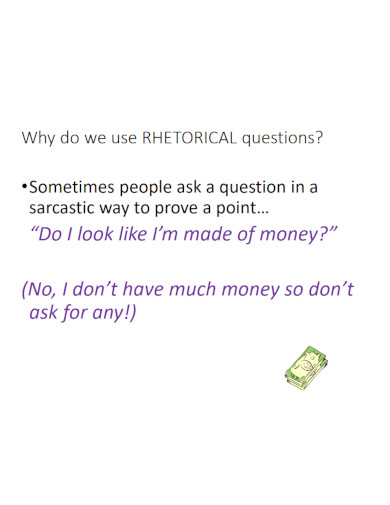
ckjs.org.uk
2. Rhetorical Questions as Redundant Interrogatives
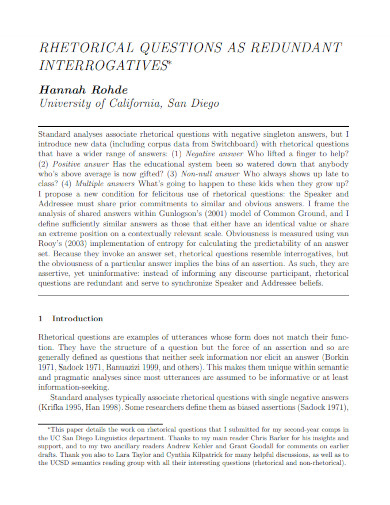
lel.ed.ac.uk
3. Rhetorical Questions Powerpoint
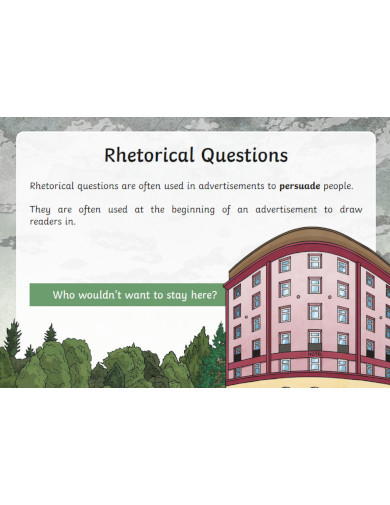
grangeton.uk
4. Rhetorical Question Use and Resistance to Persuasion
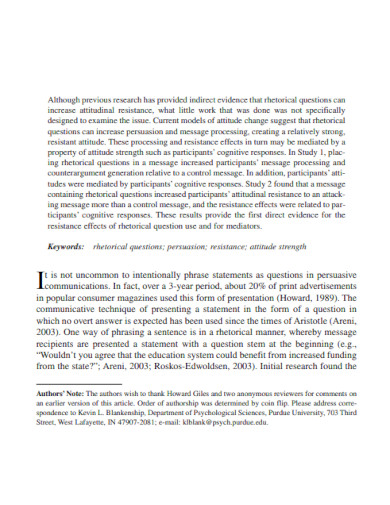
uky.edu
5. Pragmatics of Rhetorical Questions
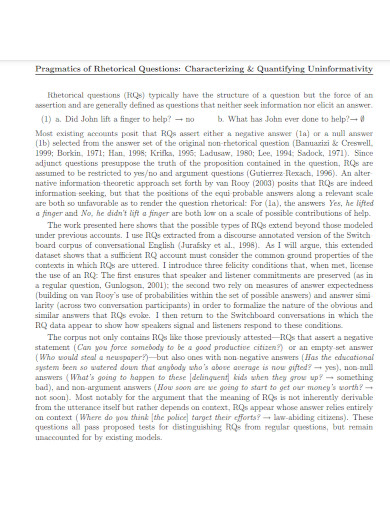
web.stanford.edu
6. Rhetorical Questions in Sunwar
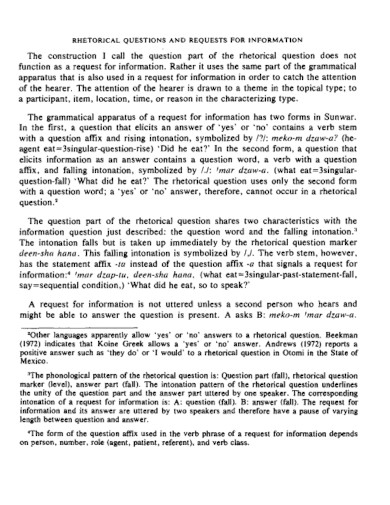
sil.org
7. Three Rhetorical Questions
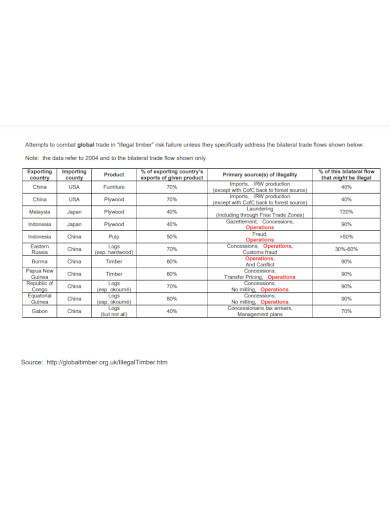
unece.org
8. Presentations Rhetorical Questions
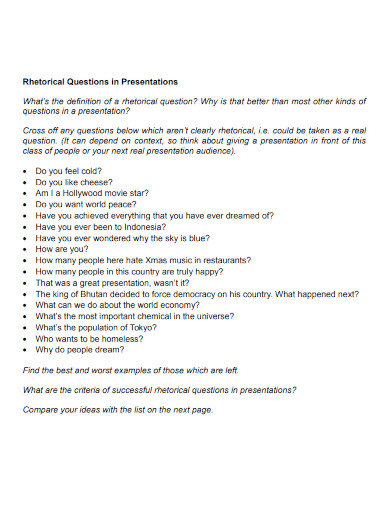
usingenglish.com
9. Rhetorical Question Concerning Glitch
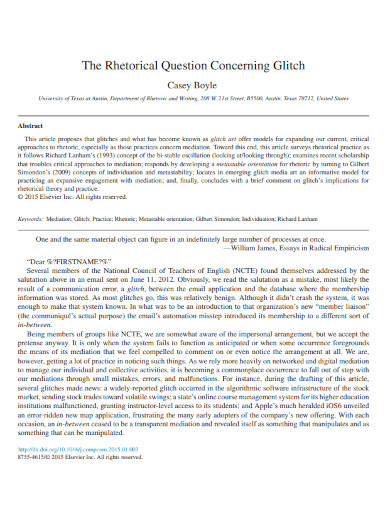
daneshyari.com
10. Rhetorical Questions in German Political Speech
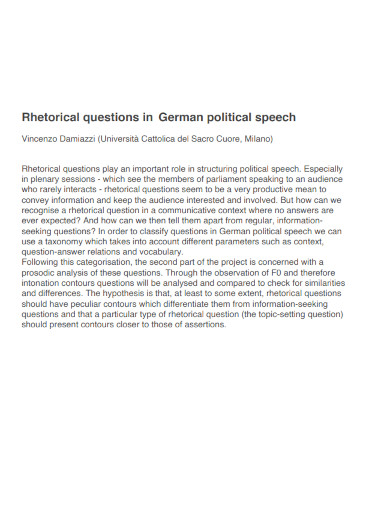
ifl.phil-fak.uni-koeln.de
11. Cognitive Pragmatic Study of Rhetorical Questions
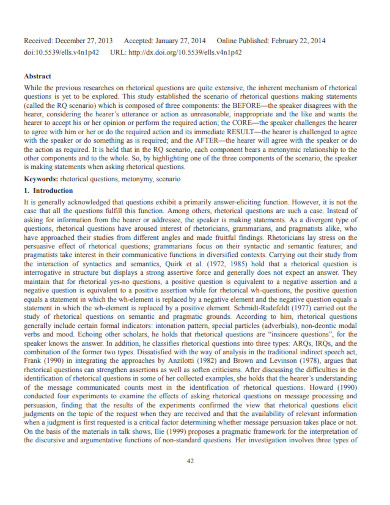
pdfs.semanticscholar.org
How To Use Rhetorical Questions as a Literary Device
Well-written rhetorical questions can improve specific parts of the text by allowing the writer to emphasize certain points of their written text. There are many studies of rhetorical questions and templates you can look up on the list above.
Step 1: Outline the Whole Statement, Scene, or Text
Begin by creating an outline that will try and succinctly cover the whole text. The outline will provide the structure and direction, which will allow you to easily plot out the setup and the rhetorical question.
Step 2: Write the Set Up for the Rhetorical Question
An effective rhetorical question needs to be preceded by a set-up that creates context and provides the reader with a recent event. Write a situation or a couple of statements that will preface the rhetorical question.
Step 3: Formulate a Question that is Opposite of The Most Recent Event
The rhetorical questions should try to ask a question that is obviously opposite or a juxtaposition of the recent event or set-up you have provided. Be sure to pose the rhetorical question as question with the appropriate punctuation.
Step 4: Re-read and Edit the Whole Text
When you have finished writing the whole text, be sure to re-read the whole text and edit any issues that may pop up. You can also have an outside person read the text and provide feedback for you to work on.
Tips for Using Rhetorical Questions
Know Your Purpose – Use rhetorical questions to emphasize a point, provoke thought, or engage the audience.
Use Sparingly – Avoid overusing rhetorical questions to maintain their impact and effectiveness.
Match Tone and Context – Ensure the question fits the tone of your message and the context in which you’re speaking or writing.
Be Clear and Direct – Make sure the rhetorical question is easily understood and directly related to your main point.
Anticipate Audience Reaction – Consider how your audience might respond mentally to the question to ensure it achieves the desired effect.
Complement with Evidence – Follow rhetorical questions with supporting evidence or statements to strengthen your argument.
Engage Emotionally – Use questions that resonate emotionally to create a stronger connection with your audience.
Use in Introductions and Conclusions – Employ rhetorical questions at the beginning to hook the audience or at the end to leave a lasting impression.
Vary Your Questions – Mix different types of rhetorical questions (e.g., hypophora, erotesis) to keep your audience engaged.
Practice Delivery – If speaking, practice your delivery to ensure the rhetorical question sounds natural and impactful.
How do you know if a question is rhetorical?
A question is rhetorical if it doesn’t seek an answer but aims to make a point, provoke thought, or emphasize an idea.
What Is the Rule of Rhetorical Question?
The rule of a rhetorical question is to ask without expecting a response, using it to highlight an argument or engage the audience.
How to Ask a Rhetorical Question?
Ask a rhetorical question by posing a thought-provoking query that emphasizes a point or leads the audience to a conclusion without needing an answer.
What Is a Question That Cannot Be Answered?
A question that cannot be answered often addresses complex, philosophical, or hypothetical scenarios, such as “What is the meaning of life?”
Why use rhetorical questions?
They engage the audience, emphasize a point, and encourage deeper thinking about a topic.
Are rhetorical questions answered?
Typically, no. They imply their own answers.
Where are rhetorical questions used?
They are commonly used in speeches, literature, and persuasive writing to engage and persuade the audience.
Can rhetorical questions be used in essays?
Yes, they can highlight important points and engage readers in essays.
Do rhetorical questions need answers?
No, rhetorical questions are meant to provoke thought or emphasize a point, not to be answered.
What is meant by a rhetoric question?
A rhetorical question is a question asked to make a point or provoke thought rather than to get an answer. It emphasizes an idea or encourages reflection.


